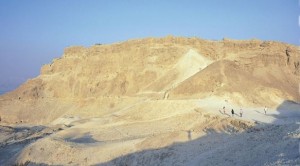One of the more enjoyable stops in our Tour of Israel is the Masada. Those with the strength often elect to climb the mountain instead of taking the lift up to the top. The climb is not for everyone, but it’s one of the more  challenging adventures on the tour. Masada was a rock fortress perched on top of a high mesa 1,300 feet above the shore of the Dead Sea. The primary access was up the eastern side along the winding “Snake path.” That path is still called that today and that’s the route we take to the top. In the picture at www.chucklarsen.com you see the climbers on their way up. The name comes from a Hebrew word that means “fortress.” David’s Psalms often celebrate God as “my fortress.” It’s believed that David used this high place as his refuge from his enemies.
challenging adventures on the tour. Masada was a rock fortress perched on top of a high mesa 1,300 feet above the shore of the Dead Sea. The primary access was up the eastern side along the winding “Snake path.” That path is still called that today and that’s the route we take to the top. In the picture at www.chucklarsen.com you see the climbers on their way up. The name comes from a Hebrew word that means “fortress.” David’s Psalms often celebrate God as “my fortress.” It’s believed that David used this high place as his refuge from his enemies.
Josephus records the suicide deaths of over 900 men, women and children. It is a revered spot in Israel and our tour guide compared the events that took place there to the events that took place at the Alamo. I’ve struggled severely with that comparison. The heroic nature of 900+ residents who took their lives rather than be conquered by the Roman Army is filled with emotional fervor. I have always wrestled with that comparison. There is a big difference between suicide and fighting to the death. The difference to me would be extremely offensive to an Israeli devotee. I would never say this to an Israeli zealot, but there is nothing heroic to me in escaping our enemy or our problems by suicide. When others attempted to divert Jesus from the cross, the text (see Luke 9:51) says “he set his face like a stone.” Many see that’s a quote from Isaiah 50:7 which verse is often interpreted from the perspective of the Messiah. It says, “Because the Sovereign LORD helps me, I will not be disgraced. Therefore, I have set my face like a stone, determined to do his will.” Jesus prayed that the cross would not be his fate, but he surrendered to God’s will. True heroism is not to escape our problems, but to face them with courage.
Further the only written account of the siege at Masada comes from Josephus. There are mentions of several other suicide pacts in his work as well, one of which he was able to escape personally. The Lexham Bible Dictionary of 2012 records that no archeological remains had ever been found that fully substantiates the suicide pact. There were approximately two dozen human remains uncovered at various levels up the mountain, but “The remains of 28 individuals fall far short of the 960 rebels reported by Josephus. The lack of any mass burial at the site suggests that the majority of Jewish rebels were taken prisoner. If any suicide pact did occur, it may have involved a limited number of people.”